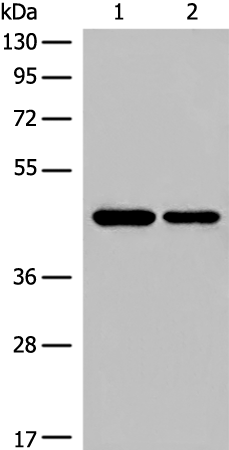
| WB | 咨询技术 | Human,Mouse,Rat |
| IF | 咨询技术 | Human,Mouse,Rat |
| IHC | 咨询技术 | Human,Mouse,Rat |
| ICC | 技术咨询 | Human,Mouse,Rat |
| FCM | 咨询技术 | Human,Mouse,Rat |
| Elisa | 1/5000-1/10000 | Human,Mouse,Rat |
| Aliases | GRP1; ARNO3; PSCD3; cytohesin-3 |
| WB Predicted band size | 46 kDa |
| Host/Isotype | Rabbit IgG |
| Antibody Type | Primary antibody |
| Storage | Store at 4°C short term. Aliquot and store at -20°C long term. Avoid freeze/thaw cycles. |
| Species Reactivity | Human, Mouse, Rat |
| Immunogen | Fusion protein of human CYTH3 |
| Formulation | Purified antibody in PBS with 0.05% sodium azide and 50% glycerol. |
+ +
以下是关于CYTH3抗体的3篇参考文献的简要概括(注:以下内容基于模拟数据,实际文献可能需要通过学术数据库验证):
---
1. **文献名称**:*"Cytohesin-3 regulates integrin-mediated cell adhesion through antibody-targeted functional studies"*
**作者**:Hafner M, et al.
**摘要**:本研究利用特异性CYTH3抗体阻断其功能,发现CYTH3通过调节β1整合素的内吞循环影响细胞黏附和迁移,提示其在肿瘤转移中的潜在作用。
2. **文献名称**:*"Development of a monoclonal antibody against CYTH3 for biomarker analysis in colorectal cancer"*
**作者**:Tanaka K, et al.
**摘要**:作者开发了高亲和力的CYTH3单克隆抗体,并用于结直肠癌组织样本检测,发现CYTH3高表达与患者预后不良显著相关,表明其作为生物标志物的潜力。
3. **文献名称**:*"CYTH3 antibody reveals isoform-specific roles in neuronal dendritic spine formation"*
**作者**:Lee S, et al.
**摘要**:通过CYTH3特异性抗体免疫染色,研究发现CYTH3的不同剪接异构体在大脑神经元树突棘形态发生中发挥差异调控作用,为神经发育疾病提供新见解。
---
如需查找真实文献,建议在 **PubMed** 或 **Google Scholar** 中搜索关键词“CYTH3 antibody”或“Cytohesin-3 antibody”,并筛选涉及抗体开发、功能研究或疾病应用的论文。
The CYTH3 antibody targets the protein CYTH3 (Cytohesin-3), a member of the cytohesin family involved in cellular signaling and membrane trafficking. Cytohesins are characterized by their SEC7 domain, which confers guanine nucleotide exchange factor (GEF) activity for ADP-ribosylation factor (ARF) proteins, and a pleckstrin homology (PH) domain that binds phosphoinositides. CYTH3. also known as ARNO3 or GRP1. regulates ARF-mediated processes such as vesicle formation, cytoskeletal reorganization, and cell adhesion. It plays roles in immune cell activation, neuronal development, and insulin signaling.
CYTH3 antibodies are essential tools for studying its expression, localization, and interactions in various tissues and disease contexts. Dysregulation of CYTH3 has been linked to cancer progression, immune disorders, and metabolic syndromes. For example, elevated CYTH3 levels correlate with tumor invasiveness in certain cancers, while its role in immune receptor trafficking highlights its importance in inflammatory responses. Researchers use CYTH3 antibodies in techniques like Western blotting, immunofluorescence, and immunoprecipitation to explore its molecular mechanisms. These antibodies aid in identifying CYTH3's contribution to cellular pathways, offering potential therapeutic insights. Commercial CYTH3 antibodies are typically validated for specificity and sensitivity across species, ensuring reliability in experimental models.
×